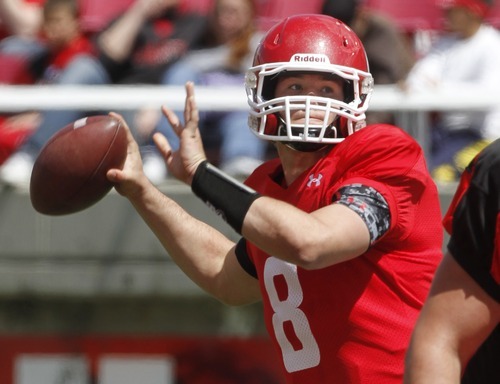This is an archived article that was published on sltrib.com in 2011, and information in the article may be outdated. It is provided only for personal research purposes and may not be reprinted.
For the past year, Pac-10 commissioner Larry Scott has been busy remolding the conference by adding Colorado and Utah, creating a championship game and overhauling the league's officiating system.
Now comes his biggest change yet, one that will make the league's members richer than ever and set a new precedent for television deals in college athletics.
Scott is expected to announce details of a $3 billion, 12-year agreement with Fox and ESPN during the league's annual meetings Wednesday in Phoenix.
The deal will take effect in 2012-13 and is worth an estimated $250 million annually. It's the richest for a college sports league and would deliver almost $21 million to each school annually, if shared equally.
The Utes won't get a full share of the revenue until 2014-15, however, under the terms of their admission to the league on July 1.
Instead, they will receive 50 percent of a distribution share in 2012-13 — that figures to be worth about $10.4 million — and 75 percent of a share in 2013-14, worth about $15.6 million.
But prospects of a smaller payout hardly dampened Utah athletic director Chris Hill's enthusiasm, especially considering the Utes received only about $2 million in revenue as a member of the Mountain West Conference with all revenue from TV, bowl appearances and tournament revenue combined.
"We're excited about the direction Larry is taking the league," Hill said. "It's not just football and basketball, but he is bringing us more exposure to a lot of sports, and what he has been able to accomplish has been great."
The Utes, whose 2010-11 athletic budget of $31.4 million is far short of the $50-60 million range of most of the Pac-10 schools, won't be totally left short next season.
Utah will receive a full share of any revenue from the creation of the Pac-12 championship game in addition to any revenue from the expanded one-year agreement with Fox in 2011-12. Utah will also receive a full share of any "new money," tied into the details of the latest contract.
The$3 billion deal has stunned even industry analysts who are accustomed to the multimillion-dollar world of sports broadcasting.
"The terms of this deal are astonishing," said John Ourand with Sports Business Daily. "If you take a look at the size and scope of this deal, the Pac-12 schools are going to be paid more than all-told what the SEC and the Big Ten were."
The SEC earned $205 million from TV rights last year, according to the Associated Press, and the Big Ten made $220 million a year. Previously, the Pac-10 was receiving $45 million a year from ESPN and Fox and made $60 million total on TV rights.
"They're going from worst to first," said AJ Maestas, the president of Navigate Marketing, a Chicago-based marketing group that conducts research and analysis in sports and entertainment. "It's going to be a couple years before we understand how big this is after the league network is formed and the distribution is finalized, but comparing apples to apples, this is better than even what the Big Ten got, which was by far the best."
The deal does not specifically include the creation of a Pac-12 Network, but the league is expected to create one with another partner in 2012.
Unlike the Big Ten Network, of which Fox has a 49-percent ownership share, the Pac-12 will own its own network, allowing it complete control. The conference will also launch a digital network to show games online that aren't on ESPN or Fox.
Maestas said Scott was able to craft such a pricey package in part because of timing. The other conferences had their deals in place first and Fox recently lost the Los Angeles Lakers contract to Comcast, creating a vacancy it needed to fill.
"It was lightning in a bottle," he said. "These things were set up with unique and rare circumstances, and they were able to take full advantage of it."
Football games will be broadcast on ABC and Fox, according to The New York Times — five will be in prime time each season — and on ESPN, ESPN2, ESPNU and FX. Basketball will be shown on ESPN, ESPN2, ESPNU and Fox Sports Net. ESPN will also carry a package of an estimated 15 Olympic sports.
ESPN and Fox will alternate broadcasting the league's new annual championship game in football, while the basketball tournament will rotate between ESPN networks and Fox and FX. —
Top of the charts
The most lucrative TV deals for college football conferences:
League Annual worth for conference Partners
Pac-10 $250 million Fox and ESPN
Big Ten $220 million ESPN and Fox
SEC $205 million ESPN and CBS
ACC $155 million ESPN and Raycom
Big 12 $155 million Fox Sports



